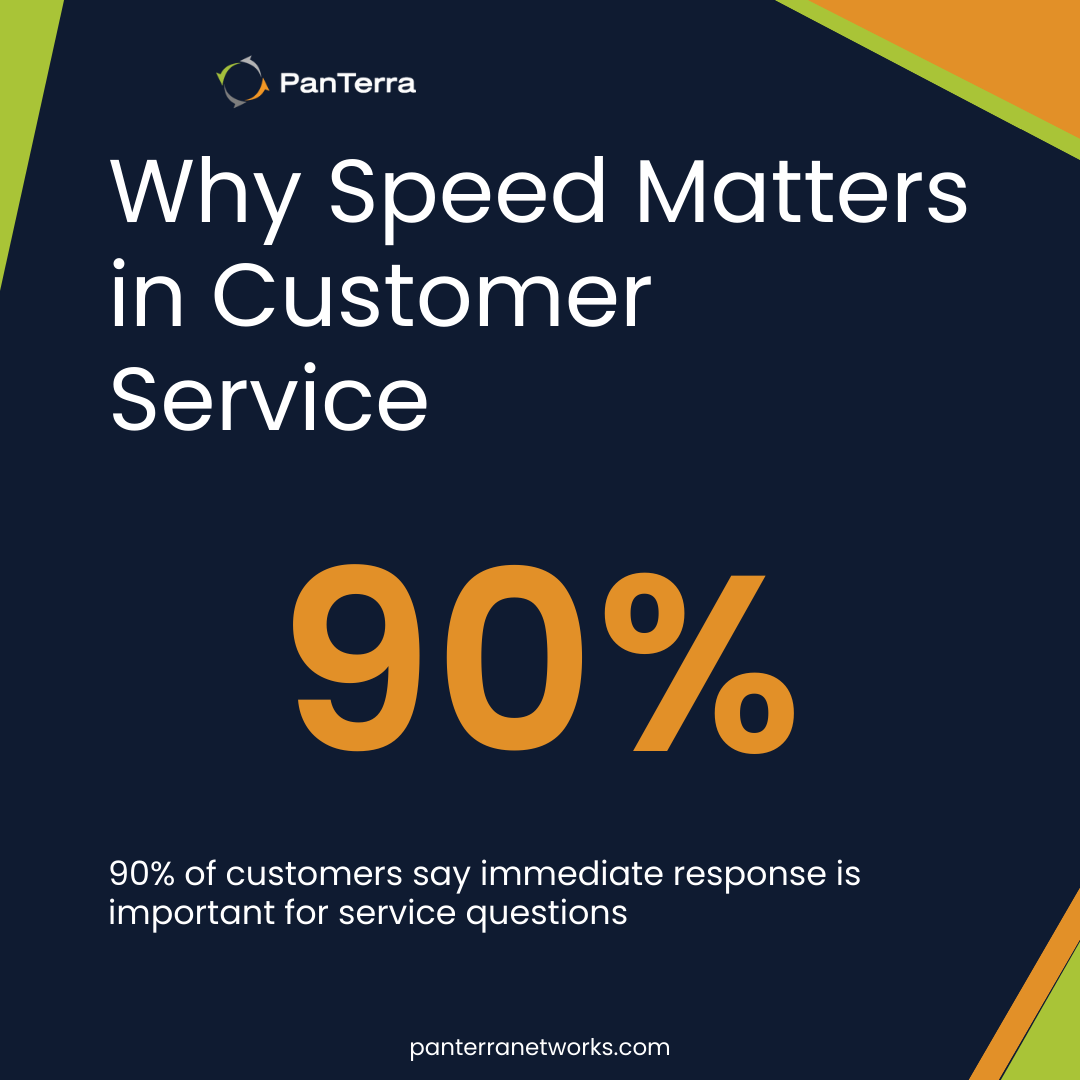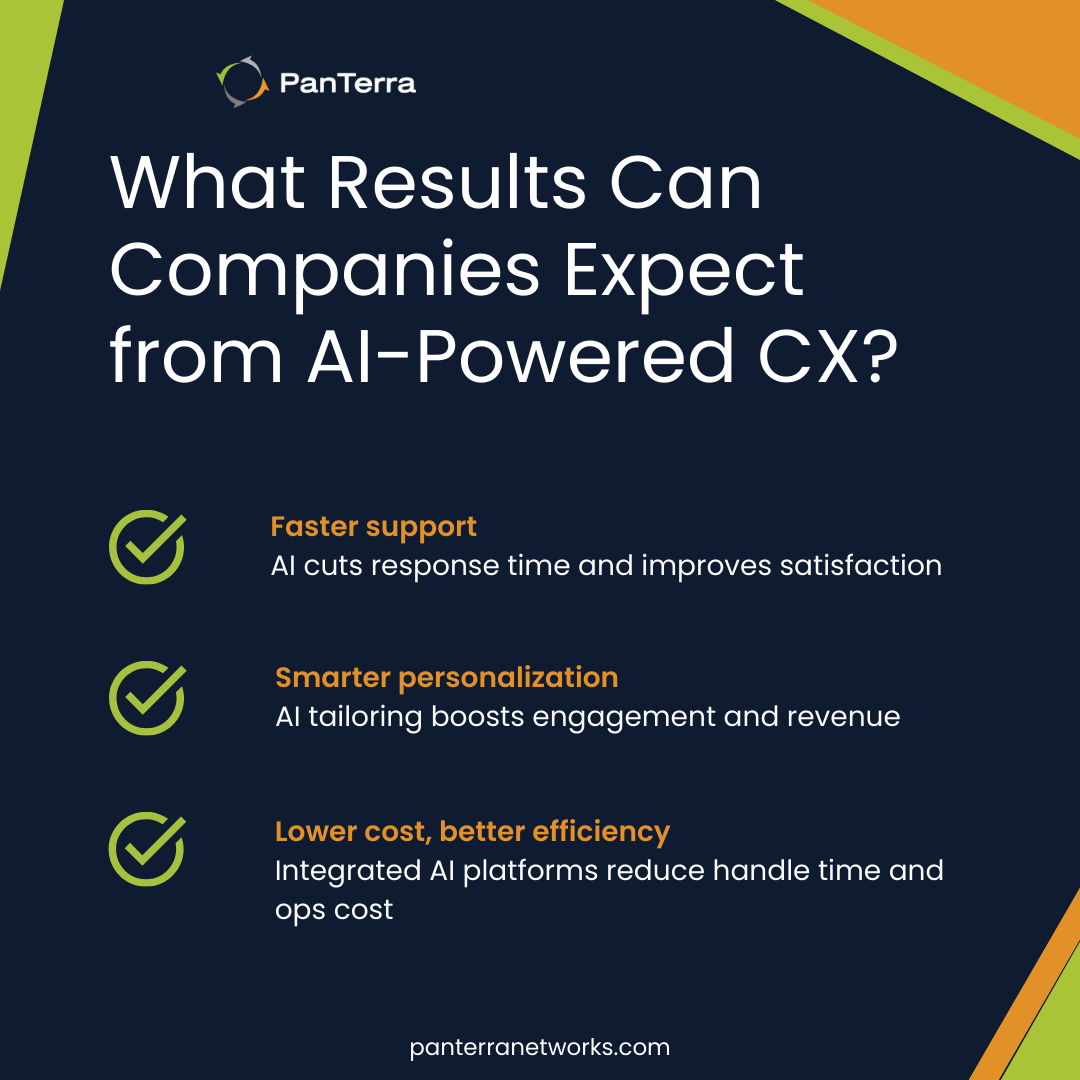How AI Customer Service Changes the Game for Small Businesses

February 29, 2024

AI helps businesses respond faster, personalize interactions, and anticipate customer needs before they arise.
For small businesses, these capabilities can level the playing field against larger competitors.
This guide covers three core areas: automation that reduces response times, personalization that builds loyalty, and predictive analytics that keeps you ahead of customer expectations.
TL;DR:
- AI automates routine queries, often cutting response times significantly
- Personalization through AI increases engagement by tailoring interactions to individual preferences
- Predictive analytics helps businesses address customer needs before issues arise
- Successful implementation combines AI tools with human agents—not replacement, but collaboration
How Does AI Improve Customer Experience?
AI improves customer experience in 3 key ways: speed, personalization, and consistency.
Faster Response Times
AI-powered systems handle routine questions instantly. Customers get answers at 2 AM without waiting for business hours.
This matters because 90% of customers rate immediate response as important when they have a service question.
Personalized Interactions
AI analyzes purchase history, browsing behavior, and past conversations to tailor each interaction.
Instead of generic responses, customers receive recommendations and solutions relevant to their specific situation.
PanTerra's Streams.AI combine cloud communications with AI-powered personalization. This enables businesses to deliver consistent, tailored experiences across voice, chat, and messaging channels.
Consistent Quality
Human agents have good days and bad days. AI maintains the same quality standard on every interaction.
It remembers previous conversations, understands context, and provides accurate information without fatigue.

What AI Tools Drive Customer Satisfaction?
Several AI tools directly impact customer satisfaction. Here's what works for small and mid-sized businesses:
AI Receptionists
AI receptionists handle routine queries 24/7 and route complex issues to human agents. They answer FAQs, schedule appointments, and collect customer information before handoff.
Luna AI functions as a virtual receptionist.
It greets callers, understands intent, and directs conversations appropriately, reducing wait times and improving first-contact resolution.
[video]
Predictive Analytics
AI examines patterns in customer behavior to forecast future needs. Businesses can identify at-risk customers before they churn, spot upsell opportunities, and address service issues proactively.
For SMBs, this means competing on insight rather than headcount.
Sentiment Analysis
AI tools evaluate customer feedback across channels—emails, reviews, social media—to gauge satisfaction in real time.
It plays an instrumental role in understanding the hidden emotions within customer feedback.
This helps businesses catch problems early and adjust strategy quickly.
Visual Recognition Tools
AI can identify products by color, shape, or style from images.
In retail, this enables visual search and “shop the look” experiences that help customers find what they want faster.
AI-Powered CRM Systems
CRM platforms now embed AI to optimize customer touchpoints. They analyze interaction history, predict customer needs, and suggest next-best actions for agents.
The result: agents spend less time searching for information and more time solving problems.
When integrated with your business communication solution, nothing falls through the cracks.
How Should Businesses Implement AI in Customer Service?
AI customer service works best when integrated strategically, not deployed as a standalone solution.
-
Start with High-Volume, Low-Complexity Tasks
Identify repetitive queries that consume agent time: password resets, order status checks, appointment scheduling. These are ideal for AI automation.
Reserve human agents for complex issues requiring empathy, judgment, or creative problem-solving.
-
Train AI with Quality Data
AI performance depends on training data. The better your data—accurate, complete, representative—the better the AI performs.
Start with your most common customer scenarios. Expand coverage as the system learns.
-
Maintain Transparency
Let customers know when they're interacting with AI. Most people accept AI assistance when expectations are clear.
Provide easy escalation paths to human agents. Customers should never feel trapped in an automated loop.
-
Monitor and Adjust
AI customer service isn't "set and forget."
Track metrics like resolution rate, customer satisfaction scores, and escalation frequency. Use this data to refine AI responses and identify gaps.
What Results Can Companies Expect from AI-Powered CX?
Companies implementing AI in customer service report measurable improvements across key metrics.
Netflix uses machine learning to analyze viewing preferences across its subscriber base. The platform generates tailored recommendations for each user based on watch history and behavior patterns.
A large share of viewing comes from AI recommendations. It shows how personalization, when done well, directly lifts engagement.
- SMB takeaway: You don't need Netflix's budget. The principle applies at any scale—use customer data to personalize recommendations and communications.
Starbucks' "Deep Brew" AI engine suggests menu items based on order history, time of day, and local weather. This personalization has been used to increase average order value and satisfaction.
- SMB takeaway: Even simple contextual triggers (time of day, purchase history) can meaningfully improve customer interactions.
MasterCard uses AI for real-time fraud detection through its Decision Intelligence system. It catches fraudulent activity while reducing false declines, so legitimate customers complete purchases with less friction.
- SMB takeaway: Security is part of customer experience. AI that reduces friction in high-stakes moments directly improves satisfaction and trust.
PanTerra + Five9: Integrated CX Platform
PanTerra Networks partnered with Five9, and recent healthcare deployments show how integrated AI reception and contact center automation can reduce handle time and operational cost at scale.
The integration demonstrates how tech partnerships can deliver enterprise-grade customer experience tools to growing businesses.
When evaluating your next AI Customer Service tool, look for platforms that integrate AI across channels rather than point solutions that create silos.

AI Customer Service: Your Takeaways
Ready to explore how AI can improve your customer experience?
Start by auditing your most common customer queries. Identify which interactions are repetitive and time-consuming for your team.
For small businesses evaluating AI-powered communications platforms, PanTerra's Streams.AI combines channel-wide AI automation capabilities.
Luna AI offers AI receptionist functionality for handling routine calls and routing.
The most successful implementations start small, measure results, and expand based on data, not hype.
AI Customer Service: Frequently Asked Questions
Can AI replace human customer service agents?
No. AI handles routine, repetitive tasks efficiently. Human agents remain essential for complex issues, emotional situations, and relationship building. The goal is collaboration: AI handles volume, humans handle nuance.
How long does AI implementation take?
Basic chatbot deployment can happen in weeks. Full integration with CRM, analytics, and multi-channel communications may take a few months depending on complexity and existing infrastructure.
What's the ROI of AI in customer service?
ROI varies by implementation. Common metrics include reduced average handle time, improved first-contact resolution, and lower cost per interaction. Results depend on scope and data quality, so track your baseline before deployment and compare after rollout to measure real impact.
Do customers prefer AI or human agents?
It depends on the task. For simple queries (order status, hours, FAQs), most customers prefer fast AI responses. For complex or sensitive issues, they prefer human agents. Effective CX offers both options.
.jpg?width=500&height=500&name=Are%20you%20Getting%20a%20Good%20Deal%20(1).jpg)
Comments